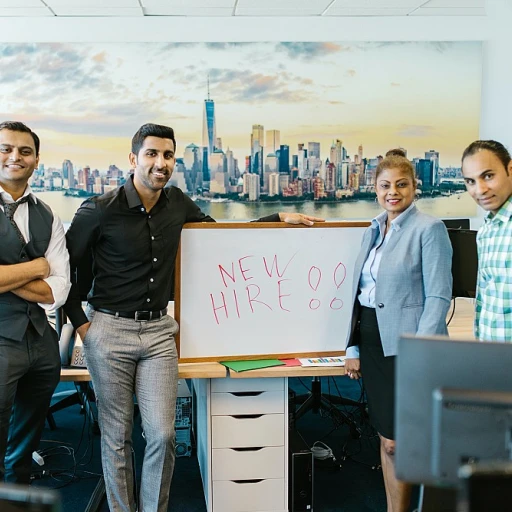
The Evolving Workforce Landscape
Adapting to a New Workforce Environment
The workforce landscape continues to evolve at a rapid pace, driven by technological advancements, societal shifts, and changing employee expectations. As companies adapt, they encounter both challenges and opportunities in shaping the future of work.
Companies are increasingly faced with the necessity to foster open communication between employees and management. This communication is crucial to address issues of employee morale and to ensure that employees feel valued and heard within the organization. By establishing a work environment that prioritizes problem solving and collaboration, teams can effectively address the myriad of challenges that arise from this evolving landscape.
Additionally, the infusion of digital technology into the workplace has opened up new avenues for global cooperation. This presents opportunities for teams to collaborate across borders, enhancing their ability to operate on a global scale. While this offers a wealth of opportunities, it does require more rigorous problem solving skills and a strong foundation of trust within the team.
Employees must now develop a synergy between their interpersonal skills and digital fluency to adapt in this new era of work. As roles are transformed by technology, employees are challenged to upskill continuously and adapt to change. Companies that prioritize continuous learning and global cooperation are better positioned to navigate the uncertain terrain of the modern workplace.
To effectively manage this transition, companies need to focus on establishing policies that support a balanced work-life dynamic. This, alongside providing clear communication channels and cultivating a dynamic team culture, will help in turning challenges into opportunities for growth and innovation.
For insights into how companies can strategically navigate these changes, explore our detailed analysis on navigating the future of work.
Technological Integration and Human Skills
Bridging Technology with Human Capabilities
In the evolving landscape of the workforce, technological integration is increasingly becoming a vital component. Companies are seeking ways to meld human capabilities with state-of-the-art technology to drive efficiency and innovation. This shift presents both challenges and opportunities.
With the rapid advancement of digital tools, employees and teams face the task of constantly adapting to new systems. These changes require not only investment in technological infrastructure but also in employee training to ensure that team members are equipped to handle new tools effectively.
However, the true challenge lies in creating a balanced workplace where human skills like problem solving, creativity, and open communication complement technological advancements. As employees work alongside digital tools, maintaining employee morale becomes crucial, particularly when considering the impact of remote work and the potential feelings of isolation it can bring. Ensuring that employees feel valued amidst these changes is essential.
Moreover, as companies delve deeper into technologies, they must also address privacy policy concerns. Trust among the team and employees is vital, especially in a remote work setting where information is exchanged digitally. Companies need to develop solutions that prioritize the privacy and security of employee data.
In this context, global cooperation and communication platforms play a pivotal role. They help overcome geographical barriers, turning challenges into opportunities by fostering better cooperation and communication across different teams.
For businesses aiming to successfully navigate these opportunities and challenges, continuous learning is key. This involves not only staying abreast of technological advancements but also understanding the importance of the human element within the workplace. Companies that invest in both areas are better equipped to sustain long-term growth and employee satisfaction.
Exploring alternatives between affinity and hubspot can provide insight into how to effectively integrate digital solutions with human capabilities in the workplace.
Remote Work: Flexibility vs. Isolation
Balancing Flexibility and Connection in Remote Work
The shift towards remote work has transformed the traditional workplace, offering both opportunities and challenges for companies and employees alike. On one hand, the flexibility of working from home allows employees to better manage their work-life balance. However, it also presents the challenge of isolation, which can impact employee morale and productivity over time.
With the integration of digital solutions, remote work has become more feasible, yet it requires open communication and trust among team members. Companies need to invest in technologies that facilitate global cooperation and seamless communication, ensuring that employees feel connected despite the physical distance. Encouraging regular check-ins and virtual team-building activities can help in dealing with the isolation that remote work might bring.
Moreover, remote work demands a change in leadership styles. Leaders must adapt to managing teams in a digital environment, focusing on outcomes rather than hours worked. This shift will help build a culture of trust and cooperation, which is essential for long-term success. As companies navigate these challenges, they must also consider privacy policies and data security to protect employee information in this new digital workplace.
In conclusion, while remote work offers numerous benefits, it also requires companies to address the challenges it brings. By fostering an environment of open communication and trust, businesses can turn these challenges into opportunities for growth and innovation.
Diversity and Inclusion in the Workplace
Embracing Diversity in the Modern Workplace
In the ever-evolving sphere of work, diversity and inclusion stand as pivotal aspects that organizations must pair adeptly with the challenges of a dynamic workforce landscape. As companies dive deeper into global cooperation, they leverage diverse talent pools that enhance problem solving and foster creativity. But how do businesses bridge these present challenges with opportunities that lie ahead?
A commitment to fostering open communication among team members is vital. It encourages employees to share insights and ideas freely, thereby cultivating an environment where everyone feels valued. This inclusivity propels trust within the team, ultimately boosting employee morale and amplifying efficiency in delivering innovative solutions. Organizations are now more focused than ever on ensuring employees feel seen and heard, a move that's increasingly significant in global workplaces fraught with geographical and cultural diversity.
Moreover, digital communication plays a critical role in connecting teams spread across locations. Seamless collaboration tools are crucial in sustaining interactions that may otherwise face challenges in such a dichotomous work environment. Companies that succeed in these endeavors typically witness enhanced cooperation and productivity.
It's also essential to acknowledge the challenges that come with diversity, like potential communication barriers or cultural misunderstandings. Enterprises are thus investing time and resources into training programs that address these intricacies, promoting a workplace culture rich in collaboration and mutual respect.
For organizations facing these challenges, turning them into opportunities relies on transformative leadership that prioritizes diversity. It's about creating a cohesive strategy that supports and celebrates diverse identities while striving toward common company goals.
Sustainability and Corporate Responsibility
Integrating Sustainability into Corporate Frameworks
In the contemporary workplace, the need for sustainability and corporate responsibility has been brought to the fore. Companies are increasingly expected to incorporate sustainable practices in their operations. This change is not only driven by climate change but also by the need to build a positive corporate image and trust with employees and consumers alike.
Dealing with the environmental and social implications of business practices requires a comprehensive approach. Companies that lead in global cooperation and sustainability often exhibit a high level of open communication and problem solving. They focus on long-term solutions rather than short-term gains. This commitment to sustainable practices is essential for turning challenges posed by climate change into opportunities for innovation and growth.
Embedding Corporate Responsibility into Employee Experience
Companies today are realizing that employees want to feel part of an organization that prioritizes sustainability. When a company invests in initiatives that support environmental and social goals, it contributes positively to employee morale and satisfaction. Engaging team members in these efforts through active participation and recognition fosters a sense of purpose and belonging.
Furthermore, embracing sustainability and corporate responsibility promotes diversity and inclusion by creating a workplace culture that values varied perspectives and proactive contribution to shared goals. This not only helps employees feel valued but also enhances cooperation and communication within teams.
Strategic Initiatives for Sustainability
To foster a more sustainable workplace, companies can adopt several strategic initiatives:
- Encourage digital transformation to lower the carbon footprint.
- Implement policies that promote resource conservation.
- Invest in renewable energy sources.
- Facilitate remote work options, balancing flexibility and employee interaction.
- Offer training to employees on sustainability practices and their impact.
Emphasizing such initiatives not only addresses environmental issues but also creates challenges opportunities for companies to stand out in a competitive market. By facing these challenges head on, firms can turn sustainability into a driving force behind innovation and employee engagement. This shift towards sustainable corporate practices will redefine the workplace landscape for years to come.













